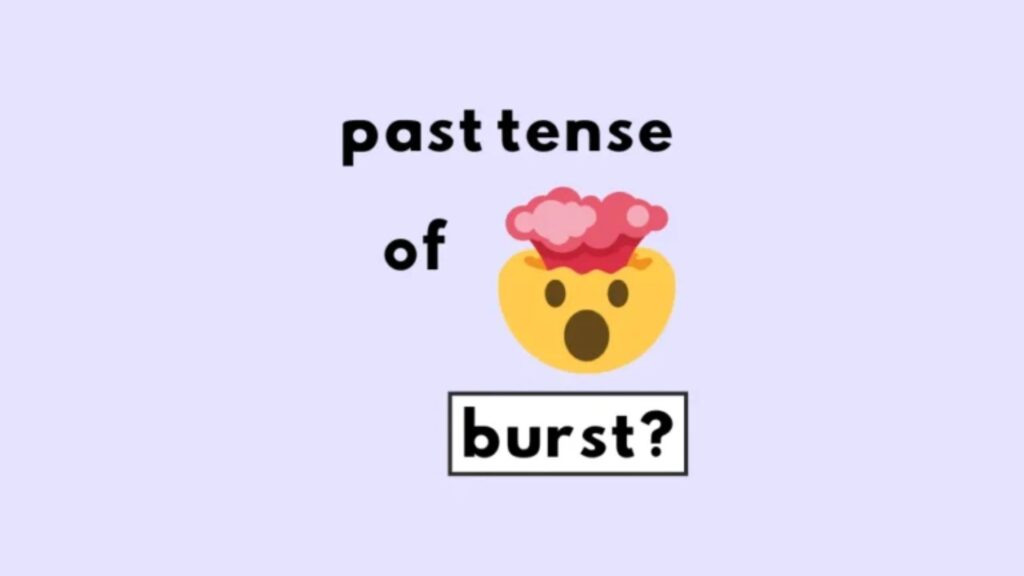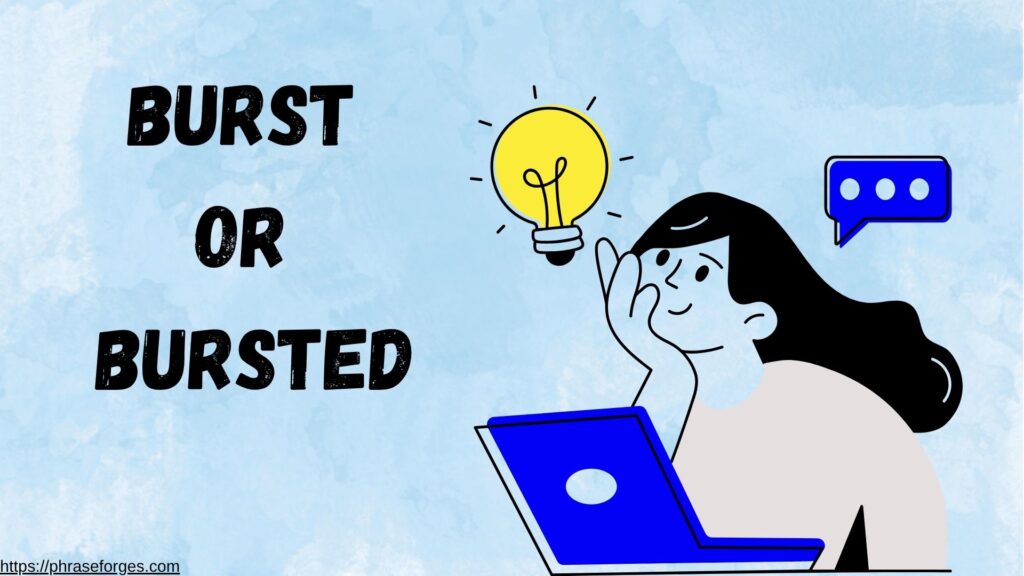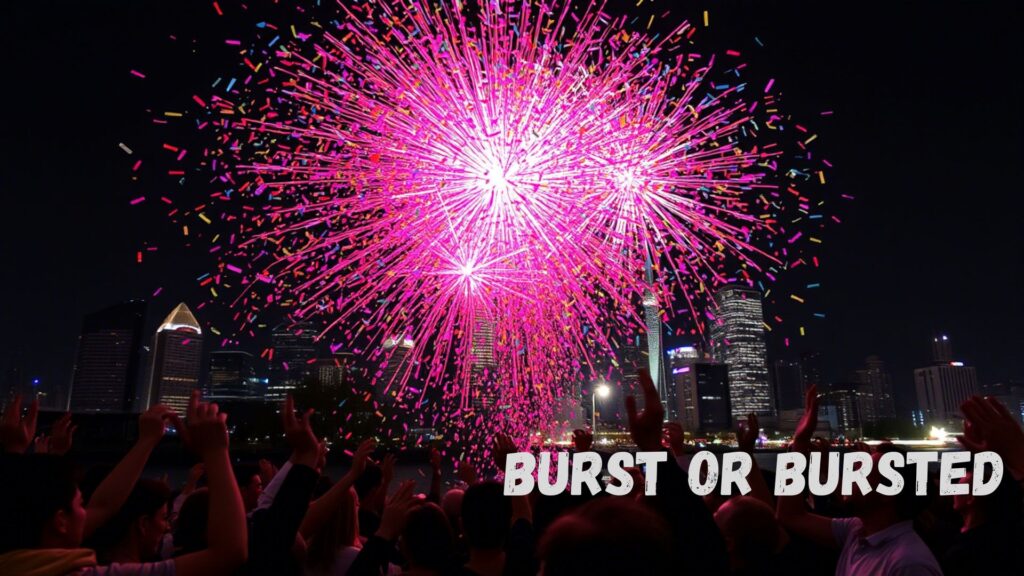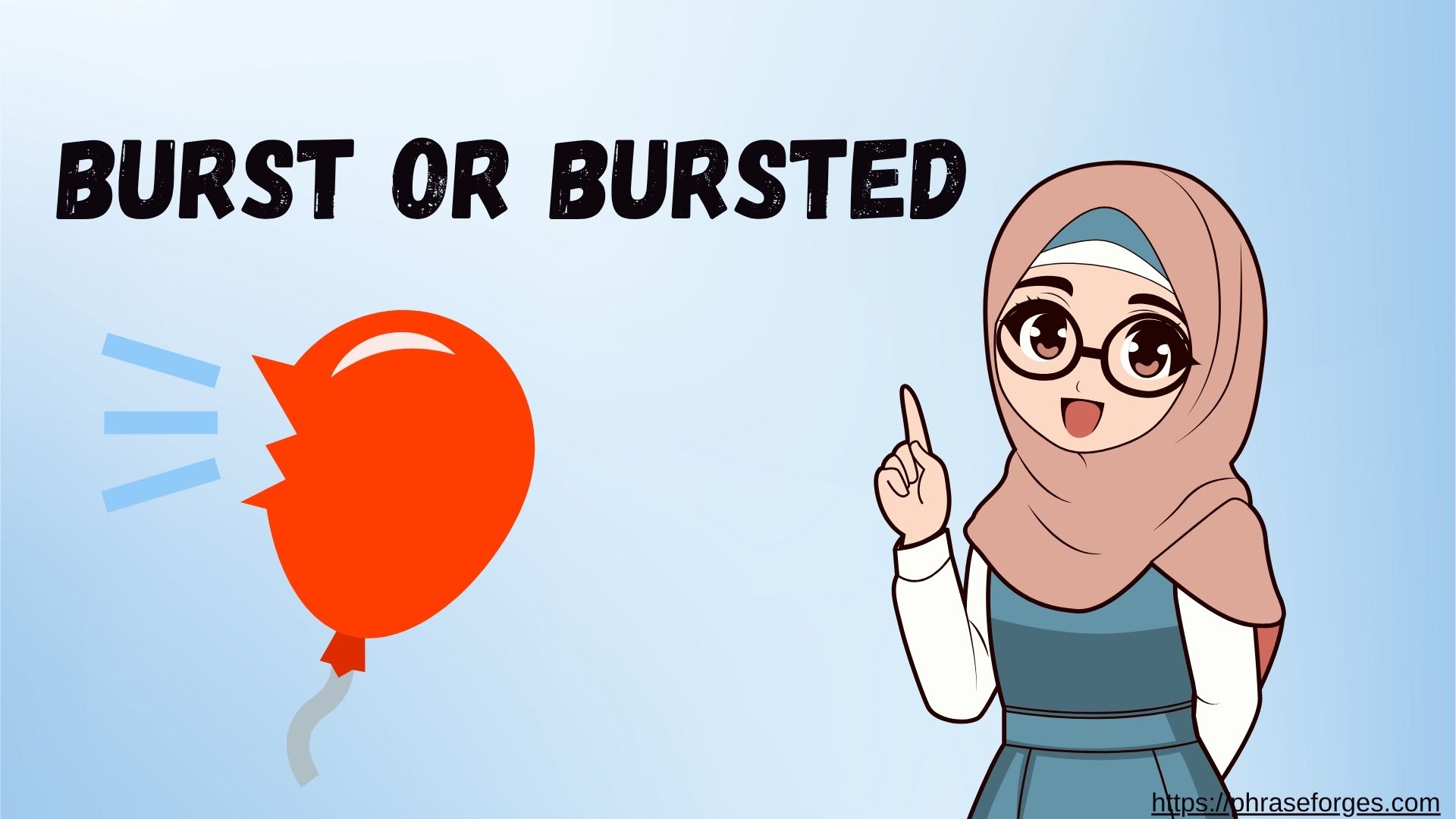You’re mid-sentence. You’re telling a story. And then… you pause. “Wait, is it burst or bursted?” It sounds simple, but even confident English speakers get caught in this grammar trap. Let’s clear up the confusion once and for all.
Whether you’re writing a report, chatting casually, or sending an email you need to know which form is correct. This guide will walk you through it in plain, friendly language (with a few fun examples).
Keyword + Intro Explanation

The debate between “burst or bursted” stems from a misunderstanding of irregular verbs in English. While many verbs in English follow the typical pattern of adding -ed for the past tense, some don’t play by those rules.
“Burst” is one of those rebels.
You might be tempted to say bursted because that’s what you do with “jump” (jumped), “kick” (kicked), or “pop” (popped). But with burst, that instinct leads you astray.
Simple Definition + Usage Overview
Let’s begin with what burst means.
To burst means to:
- Break open suddenly, often from internal pressure
- Explode or erupt, either physically or emotionally
- Emerge abruptly
It can describe balloons popping, water pipes breaking, or even someone laughing uncontrollably.
Here’s where it gets tricky (or delightfully weird, depending on how much you love grammar):
The word burst is the same in the base form, past tense, and past participle.
Yes, really.
- I burst the balloon. (past)
- I burst the balloon yesterday. (past)
- The balloon has burst already. (past participle)
So where does bursted come in?
Short answer: It doesn’t belong in standard English.
Clear Rules & Patterns

Let’s break this down with clear guidance.
✅ Use “Burst” When:
- You’re describing something that broke or exploded in the past.
- You’re writing formally, like in business, academic, or journalistic contexts.
- You want to sound polished and correct.
❌ Don’t Use “Bursted” If:
- You want your grammar to be correct.
- You’re writing for work, school, or publication.
- You care about sounding fluent and professional.
Bulleted Rules with Do’s and Don’ts
✔ Do:
- Say: “The pipe burst last night.”
- Say: “He burst into the room with great energy.”
- Say: “It had burst open by the time we arrived.”
✘ Don’t:
- Say: “The pipe bursted.” ❌
- Say: “He had bursted into laughter.” ❌
- Say: “The tire bursted on the highway.” ❌
Multiple Example Sentences
| Tense | Correct Form | Example Sentence |
|---|---|---|
| Present Simple | burst | Every morning, he bursts into the office. |
| Past Simple | burst | The balloon burst during the party. |
| Present Perfect | have/has burst | We have burst several balloons already. |
| Past Perfect | had burst | The pipes had burst before we got home. |
| Continuous | was bursting | The bag was bursting at the seams. |
Scenario Example 1: Business Email
Subject: Update on Water Damage in Unit 5
Hi David,
Just a quick note to let you know that one of the supply lines burst in Unit 5 this morning. We’ve already shut off the water and contacted maintenance.
I’ll keep you posted on the repair timeline.
Thanks,
Vanessa
✅ Correct form: burst (past tense)
Scenario Example 2: Informal Conversation
Text Message to Friend:
“You won’t believe it my soda can bursted in my bag! My laptop’s sticky!”
🛑 That sounds natural in a text but it’s grammatically incorrect.
The correct version would be:
“You won’t believe it my soda can burst in my bag!”
Before/After Examples in Everyday and Formal Contexts
| Context | Incorrect Use | Correct Use |
|---|---|---|
| Everyday Speech | “It bursted everywhere!” | “It burst everywhere!” |
| Work Report | “The pipe bursted at 3AM.” | “The pipe burst at 3AM.” |
| Email to Client | “The seal had bursted.” | “The seal had burst.” |
Common Mistakes & Fixes
| Mistake | Correction | Why it’s Wrong |
|---|---|---|
| “The balloon bursted.” | “The balloon burst.” | Bursted is nonstandard. |
| “He had bursted with joy.” | “He had burst with joy.” | Past perfect requires burst. |
| “It’s been bursted open.” | “It’s been burst open.” | Past participle is burst. |
Quick Reference Table
| Verb Tense | Correct Form |
|---|---|
| Base Form | burst |
| Past Tense | burst |
| Past Participle | burst |
| Present Participle | bursting |
| Incorrect Form | bursted ❌ |
Why Do People Say “Bursted”?

Because it feels right at first.
We’re used to regular past tense verbs like:
- kick → kicked
- walk → walked
- pop → popped
So it’s tempting to apply the same rule and say burst → bursted. But English is full of irregular verbs that just don’t follow the rules.
Consider:
- hit → hit
- shut → shut
- set → set
- hurt → hurt
These stay the same in all tenses just like burst.
So while “bursted” may show up in casual speech (especially among kids or in regional dialects), it’s not considered correct in standard written or spoken English.
Verbs That Stay the Same in All Tenses
Here are a few English verbs like “burst” that don’t change in the past:
| Verb | Present | Past | Past Participle |
|---|---|---|---|
| burst | burst | burst | burst |
| shut | shut | shut | shut |
| hit | hit | hit | hit |
| let | let | let | let |
| set | set | set | set |
✅ Recap: Which Is Right Burst or Bursted?
“Burst” is the correct word to use in every tense:
- Present: I burst out laughing.
- Past: The tire burst on the highway.
- Perfect Tense: The pipe had burst already.
“Bursted” is not considered proper English in any formal or standard use.
Final Takeaway
If you’re ever unsure, remember:
“Burst” is always correct. “Bursted” doesn’t cut it.
When you use burst correctly, your grammar pops in the best way.
🔁 Bonus: Practice Sentences
Try rewriting these sentences using the correct form:
- “She bursted into the room crying.”
➜ “She burst into the room crying.” - “I think the bag has bursted.”
➜ “I think the bag has burst.” - “It bursted open when I dropped it.”
➜ “It burst open when I dropped it.”

